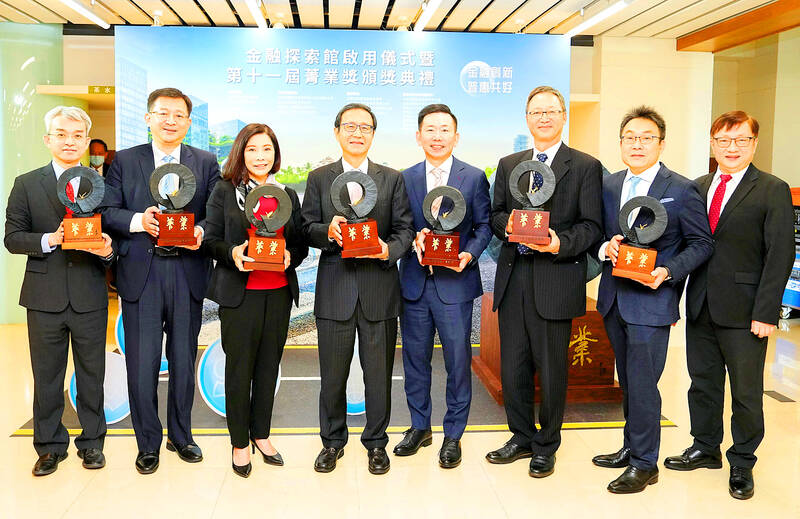CTBC Financial Holding Co (中信金控) and CTBC Bank Co (中信銀行) on Friday won seven awards at the Taiwan Banking and Finance Elite Awards ceremony in recognition of their efforts in innovating financial products and services, setting a record by winning in all of the categories they competed in.
This is another great honor CTBC has received this year after winning more than 280 awards at home and abroad, along with more than 110 patents approved, showing that CTBC not only has excellent business performance, but also strives to give back to society.
Organized by the Taiwan Academy of Banking and Finance, the biennial Elite Awards are widely regarded as the financial industry’s Oscars in Taiwan.

Photo courtesy of CTBC Bank Co
A total of 129 projects from 53 financial institutions entered this year’s competition, which went through rounds of reviews and examinations before the winners were selected.
In this year’s 11th Elite Awards ceremony, CTBC Bank was presented with “Best Green Finance Award,” “Best Wealth Management Award,” “Best Institution Trust Finance Award,” “Best Digital Banking Award” and “Best Risk Management Award.”
In addition, CTBC Bank also won “Excellence Award in Consumer Banking,” while CTBC Financial was presented with “Excellence Award in Environmental, Social and Governance” in the general finance category.
The organizer said that CTBC has moved from being a product-oriented company to a client-oriented one, and has continued to launch digital financial services that take into account convenience and agile security transaction controls.
The results have been outstanding, and CTBC is the biggest winner of this year’s Elite Awards, the organizer said.
In response to digital needs and climate change risks in the post-pandemic era, CTBC makes good use of technology and data, combined with sustainable goals, to significantly improve the effectiveness and efficiency of risk management, the organizer said.
The company also follows market trends to seek innovation and change, works to safeguard shareholders’ interests, fulfills corporate social responsibilities and offers a full range of professional trust services with outstanding results, it said.
The Elite Awards recognize the most outstanding financial institutions in Taiwan, CTBC Financial president James Chen (陳佳文) said.
As CTBC set a record by winning seven major awards this year, Chen thanked the event’s organizer and said the accolade has proven CTBC’s leading position in the nation’s financial industry.
Chen said that winning the awards was in line with the company’s core business development, from retail banking, trust business, digital finance, risk management to green financing, in compliance with government policies, as well as environmental, social and governance concepts.
Chen said CTBC approved relief loans to 280,000 people during the COVID-19 pandemic through its digital financial services, which helped contribute to social stability.
In the high-asset business promoted by the government to attract returning capital from abroad, CTBC has also achieved a leading position in the market.
The company is also a member of the “Coalition of Movers and Shakers on Sustainable Finance,” which was established on Sept. 5 to set standards of best practices for net zero transformation.

Semiconductor business between Taiwan and the US is a “win-win” model for both sides given the high level of complementarity, the government said yesterday responding to tariff threats from US President Donald Trump. Home to the world’s largest contract chipmaker, Taiwan Semiconductor Manufacturing Co (TSMC, 台積電), Taiwan is a key link in the global technology supply chain for companies such as Apple Inc and Nvidia Corp. Trump said on Monday he plans to impose tariffs on imported chips, pharmaceuticals and steel in an effort to get the producers to make them in the US. “Taiwan and the US semiconductor and other technology industries

The US Federal Reserve is expected to announce a pause in rate cuts on Wednesday, as policymakers look to continue tackling inflation under close and vocal scrutiny from US President Donald Trump. The Fed cut its key lending rate by a full percentage point in the final four months of last year and indicated it would move more cautiously going forward amid an uptick in inflation away from its long-term target of 2 percent. “I think they will do nothing, and I think they should do nothing,” Federal Reserve Bank of St Louis former president Jim Bullard said. “I think the

SMALL AND EFFICIENT: The Chinese AI app’s initial success has spurred worries in the US that its tech giants’ massive AI spending needs re-evaluation, a market strategist said Chinese artificial intelligence (AI) start-up DeepSeek’s (深度求索) eponymous AI assistant rocketed to the top of Apple Inc’s iPhone download charts, stirring doubts in Silicon Valley about the strength of the US’ technological dominance. The app’s underlying AI model is widely seen as competitive with OpenAI and Meta Platforms Inc’s latest. Its claim that it cost much less to train and develop triggered share moves across Asia’s supply chain. Chinese tech firms linked to DeepSeek, such as Iflytek Co (科大訊飛), surged yesterday, while chipmaking tool makers like Advantest Corp slumped on the potential threat to demand for Nvidia Corp’s AI accelerators. US stock

Cryptocurrencies gave a lukewarm reception to US President Donald Trump’s first policy moves on digital assets, notching small gains after he commissioned a report on regulation and a crypto reserve. Bitcoin has been broadly steady since Trump took office on Monday and was trading at about US$105,000 yesterday as some of the euphoria around a hoped-for revolution in cryptocurrency regulation ebbed. Smaller cryptocurrency ether has likewise had a fairly steady week, although was up 5 percent in the Asia day to US$3,420. Bitcoin had been one of the most spectacular “Trump trades” in financial markets, gaining 50 percent to break above US$100,000 and